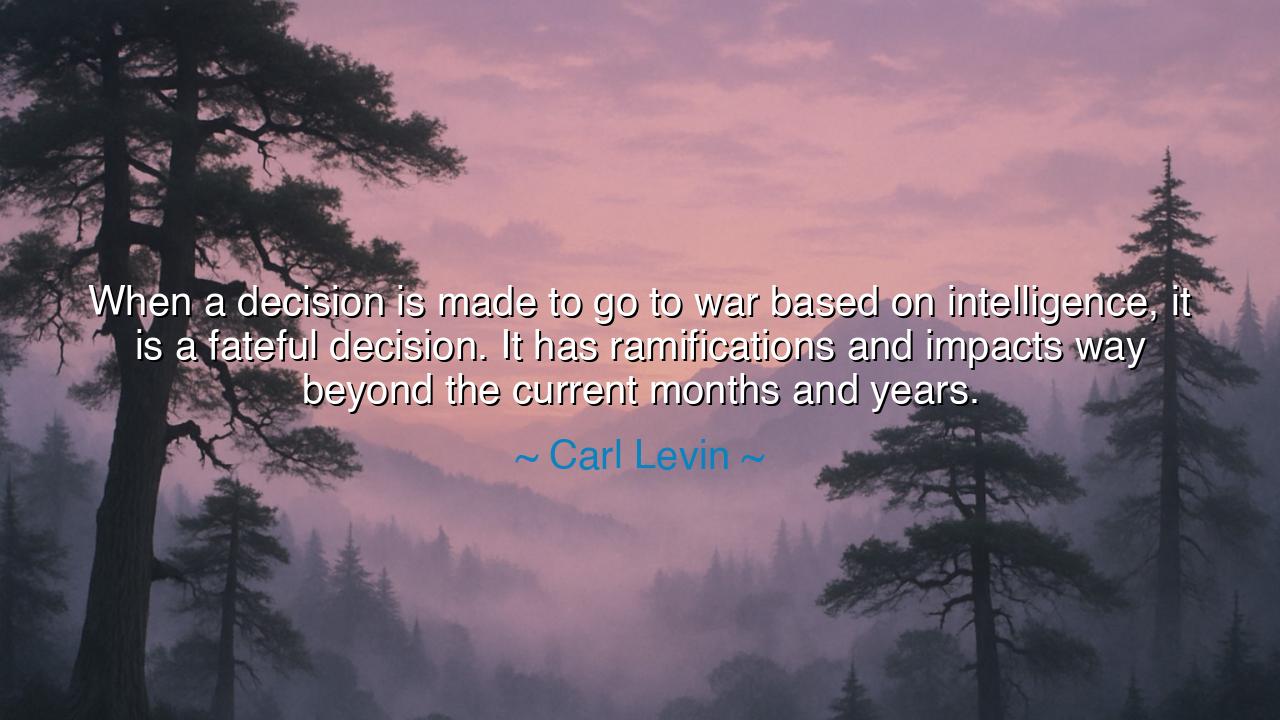
When a decision is made to go to war based on intelligence, it is
When a decision is made to go to war based on intelligence, it is a fateful decision. It has ramifications and impacts way beyond the current months and years.






“When a decision is made to go to war based on intelligence, it is a fateful decision. It has ramifications and impacts way beyond the current months and years.” — Carl Levin
In these grave and timeless words, Carl Levin, a statesman of conscience and foresight, speaks to the ancient and terrible burden of war — a burden that has tested the wisdom of kings and the souls of nations. His words rise from the halls of government, yet they echo with the voice of history itself, reminding us that decisions born of intelligence, when turned toward battle, are not simply political acts but moral judgments that ripple across generations. A decision for war is never confined to the moment; it is a stone cast into the deep waters of time, and its waves touch the innocent and the unborn alike.
The origin of this quote lies in Levin’s long service as a United States Senator and his role in examining the wars of the modern age — particularly the invasion of Iraq in 2003. He witnessed firsthand how intelligence — the secret knowledge upon which leaders rely — could be flawed, misused, or misinterpreted, and how the consequences of such errors bring suffering that cannot be undone. When he speaks of “a fateful decision,” he invokes the solemn truth that once the dogs of war are loosed, they cannot easily be called back. The blood shed, the lives broken, the trust lost — these are debts that linger long after the banners are folded and the speeches fade.
The ancients, too, understood this truth. In the Greek world, Agamemnon made his fateful decision to wage war upon Troy, not through careful counsel but through pride and persuasion. The seers warned him that the winds of destiny would not favor him, yet he chose the path of blood. The Greeks conquered Troy, yes — but Agamemnon’s victory birthed vengeance, and his own life ended by the blade of his wife upon his return. Thus, the ramifications of war, once unleashed, move beyond the battlefield; they poison the hearth, divide the generations, and teach cruelty to those who once sought honor. Levin’s warning is of this same pattern — that even in an age of satellites and spies, the ancient price of war remains unchanged.
To decide upon war based on intelligence is to step upon a path shrouded in uncertainty. Intelligence, however advanced, is the art of seeing through a glass darkly — it reveals fragments, possibilities, shadows of truth. To act upon it is to act not with omniscience, but with faith and humility, knowing that even the wisest counsel may falter. Thus, Levin’s words remind us that the leader must not only listen to intelligence but interrogate it, temper it, and measure it against conscience. For when intelligence becomes justification rather than illumination, it ceases to serve wisdom and becomes an instrument of folly.
The world saw this most vividly in the early twenty-first century, when nations went to war on the strength of intelligence reports that claimed weapons of mass destruction existed in Iraq. These reports, later discredited, led to years of conflict, countless deaths, and instability that reshaped the Middle East. Levin, as chairman of the Senate Armed Services Committee, understood that the decision had not only military consequences but moral ones. For the dead do not rise when the truth comes too late, and history is merciless toward those who mistake haste for necessity. From this tragedy, Levin drew his warning: that a war begun in the fog of uncertain intelligence may haunt a nation longer than any enemy could.
And yet, his message extends beyond nations and generals — it reaches into the heart of every decision we make in our own lives. For each of us, too, wages wars of our own: in families, in communities, in the quiet chambers of the soul. When we act in anger, in assumption, or in half-seen truth, we risk bringing harm that endures beyond the moment. Just as nations must guard their judgment with humility, so must we. We must seek truth not only in information, but in reflection, in compassion, in understanding. For every word spoken in haste, every act born of ignorance, has ramifications beyond the day of its doing.
The lesson, then, is this: let no one rush to battle, whether with armies or with words. Seek wisdom before action. Question what you are told, for even the cleverest “intelligence” can deceive. Know that every choice made in passion will echo into the years to come. The wise act slowly, for they see not only the fight before them, but the peace that must follow. Remember always that to start a war is easy, but to heal its wounds is the labor of generations.
So, my children of thought and courage, take heed of Carl Levin’s warning. When the call to action comes, ask not only, “Can we win?” but “Should we begin?” Let your intelligence be guided by integrity, your power restrained by principle, and your courage softened by mercy. For all decisions, whether in the chamber or the heart, carry weight far beyond the hour — and the mark of true wisdom is to act today with the eyes of eternity.






AAdministratorAdministrator
Welcome, honored guests. Please leave a comment, we will respond soon